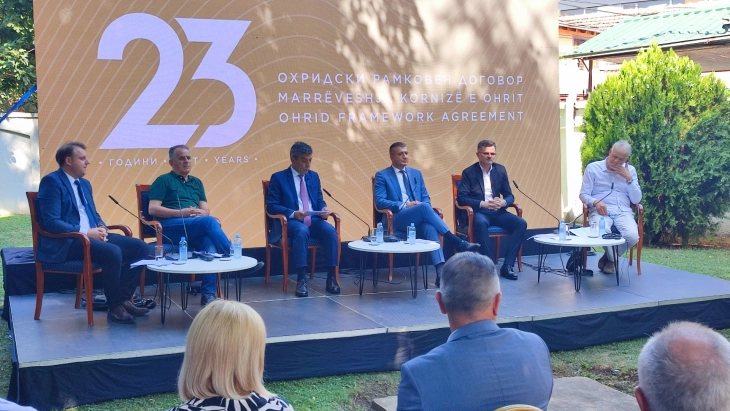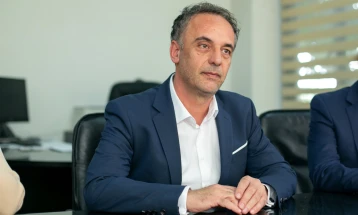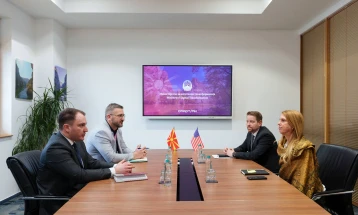Panel: 23 years since the Framework Agreement, effective decentralization remains a challenge
- From a post-conflict society, whose functioning is guaranteed by a peace agreement, our task is to make North Macedonia a modern society in which the institutions will reflect full equality at every level. We cannot agree forever, the time has come now to return the agreements reached to the basis for modernization and Europeanization of the state. In the period ahead, we will open a new stage of policymaking, First Deputy PM and Minister of Environment and Physical Planning Izet Mexhiti told a panel discussion on "23 years since the Framework Agreement, decentralization remains a challenge".

Skopje, 13 August 2024 (MIA) - From a post-conflict society, whose functioning is guaranteed by a peace agreement, our task is to make North Macedonia a modern society in which the institutions will reflect full equality at every level. We cannot agree forever, the time has come now to return the agreements reached to the basis for modernization and Europeanization of the state. In the period ahead, we will open a new stage of policymaking, First Deputy PM and Minister of Environment and Physical Planning Izet Mexhiti told a panel discussion on "23 years since the Framework Agreement, decentralization remains a challenge".
As a NATO member state, disturbance of the peace, Mexhiti said, "is no longer an option for our country," stressing that the challenge today is how to make more effective decentralization, more powerful institutions, a more independent judiciary, freer media and a more functional democracy.
"It is the duty of the central government to engage itself much more in the strengthening of local authorities by offering them more resources, more independence, more opportunities for development and efficiency, because municipalities are the first door citizens knock on when in need. There are many areas in which the division of responsibilities in practice or on the ground seems absurd. In those aspects, it is necessary to redefine and reorganize the current legal mechanisms and solutions. Municipalities need greater financial independence and greater tax collection. They cannot be self-sustainable without financial independence, and financial independence is a guarantee of non-interference of the central government in an arbitrary manner in the affairs and powers of the local government," Mexhiti said opening the panel discussion.
He noted that the local government needs strengthening of fiscal decentralization, not just decentralization of obligations. According to him, this means that increased obligations must be followed by an increase in financial resources, which will enable a new concept of economic development in which municipalities will be its generators.
As a former mayor and current Environment Minister, Mexhiti called for municipalities to have more powers to deal with environmental issues, and he also pointed to decentralization in education and security as major challenges.
"The first thing in this direction is depoliticization for the sake of professionalization of education. Education in which the competences and responsibilities of the local and central governments will be clearly defined, where quality, creativity, innovation will be embedded in the education system," said Mexhiti.
As regards decentralization in terms of security, he pointed out that "the responsibilities between the local and central governments in this sphere are not fully specified" and "the role of the municipality and the local government should in no way be underestimated".
"The municipality, in cooperation with the citizens, is the one that knows best where the hotspots of criminal groups and violators of public order and peace are. Therefore, efficient mechanisms must be established where the citizen will be an active protector of security, instead of being a victim of crime and criminal gangs. For that purpose, greater and more efficient cooperation of the council of the municipality, the mayor with the police and security authorities is needed," the First Deputy PM said.

Minister of Local Self-Government Zlatko Perinski said that the Ohrid Agreement and immediately after the amendments to the Constitution and the adoption of the Law on Local Self-Government, "practically reaffirmed the unitary character of the state with a clear commitment to building a modern decentralized system of local self-government based on the principles of the European Charter for Local Self-Government".
"In general, we have a decentralized functional local self-government, which, despite all the challenges, realizes its competences, sometimes more successfully, and other times less successfully. The challenges are different in the different units of local self-government. It all depends on the financial and human resources at their disposal, but it also depends on the capacity of local authorities to manage complex systems. It is equally important that the local authorities try to listen to the citizens, to listen to their needs and their requests. The most important thing is the satisfaction of the citizens. They are our mirror. The local self-government is now faced with new challenges arising from the priority needs of the citizens," Perinski pointed out.
According to him, the open political dialogue between the central and local governments within the institutions is the only way to systematically resolve all issues, and the financial stability and sustainability of the local self-government units requires greater support from the central government for the realization of capital and larger infrastructural projects.
"Citizens properly expect a better quality of life. That is the most important thing to them. Unfortunately, many of the basic issues, such as road infrastructure, modern schools and kindergartens and other basic needs have not been resolved. Therefore, in the period ahead, the Government will simultaneously work on strengthening the financial resources of local governments, as well as direct financial support for the implementation of priority infrastructure projects," stressed the Minister of Local Self-Government.
Perinski pointed out that the financial capacity of the municipalities depends on the sources of financing of the central government, but, he noted, "the sources of financing of the local self-government units themselves, which are determined by law, should neither be disregarded."
New challenges in the decentralization process, he added, are the digitization of services, the introduction of new technologies in process management and the start of developing the concept of smart cities.
On the support of the local government from the central government, Perinski pointed out, the Government's program foresees the establishment of a resource centre to support the development of the municipalities which will function in the Ministry of Local Self-Government.
Professors Rizvan Sulejmani, Nano Ruzhin, Afrim Osmani and Bujamin Bela also addressed the panel, discussing the strengths and weaknesses of decentralization, as well as the legal and financial aspects of the process.
Photo: MIA







